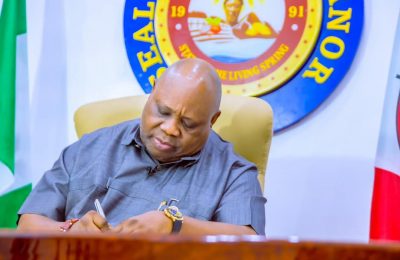Nigeria’s Federal Ministry of Aviation and Aerospace Development under the supervision of Festus Keyamo, recently presented a proposed Fly Nigeria Act and related legislation aimed at bolstering indigenous flag carriers and creating a sustainable aviation industry.
Speaking at a stakeholder engagement meeting in Abuja, Keyamo underscored the need for government to support the Nigerian airlines.
To show the government’s seriousness towards backing the domestic carriers, Keyamo insisted that all government-funded trips must now prioritize Nigerian flag carriers over foreign airlines to complement government’s efforts towards making the sector a competitive market.
According to Keyamo:“Every government-funded trip whether local, regional, international or continental must first utilise Nigerian flag carriers before considering foreign airlines”.
There is already a proposed legislation seeking to create a market for the Nigerian airlines, even in cases where routes do not currently exist, thus positioning the country’s aviation sector as a viable competitor in the global market.
The bill, if passed, is capable of boosting domestic air transport which should ordinarily bring positivism to the sector, however there are so many factors that may stand on the way of making the fly act policy a reality.
Since the minister revealed the new policy, the entire sector has been engulfed in controversial comments mostly centered on why the act may actually not fly.
As good as the proposed fly act is meant to be, there is however the need for the government, through the minister to realize the fact that much is required to make the act work.
In other climes where the fly act works, the government would have first put its house in order through the implementation of positive policies capable of promoting good business environment.
The policy of fly Nigeria act is not new to the sector as the policy was also in place during the former Nigeria Airways days which did not last before it was jettisoned.
For the act to work, it is expected that the minister would first take the campaign to the circles of topmost government officials including the National Assembly and obtain their cooperation before throwing the issue open to the lower caders of government workers.
The fly act may actually not work because those who should support it like the governors, National Assembly members, ministers may, largely not buy into the policy because of the systemic corruption that has eaten deep into the fabric of the society.
Read Also: Orange peels, orange juice improve heart health — Research
Also the act may not materialise because most of these government officials and the National Assembly members will be the first to sabotage the patriotic efforts for so many reasons ranging from lack of confidence in anything Nigerian, capacity of the top officials to own private jets, corruption, ‘bigmanism’ and other unpleasant reasons.
Again, the government may not be able to fully enforce the policy based on its inability to fully position the domestic carriers for better services, which many of the government officials may lay claims to for not wanting to support the fly act.
Therefore, to enforce the fly act policy, it is pertinent for the minister to hold stakeholders meeting to be able to hear from them as to how the policy can work for all principal actors including the airlines.
Until all the necessary issues confronting the sector which are making domestic airlines to struggle for survival and their subsequent below the standard performance addressed, it may make the fly act a tall dream.








